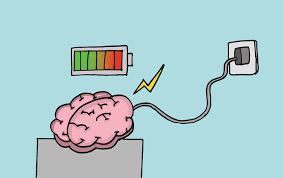Not a phone charger, but Brain charger?
- rhogens

- Jun 12, 2020
- 3 min read
Updated: Aug 2, 2020
We live in a technological dominated world in which our cell phones are heavily used throughout the day and we charge them in various ways. Some people charge their phones by connecting to ports in the car, while others use wireless chargers. However, we make relentless efforts to keep our phones charged throughout the day. This involves maximum effort especially when we are multi-tasking, ie. posting on social media during a boring staff meeting only to return to our desk with 1% battery life. We then fly around the building like superheroes looking for the nearest charger.
Our brain probably envies the cell phone at times. We also live in a fast-paced world in which our brains are often used throughout the day, but we rarely make relentless efforts to charge it. Think to yourself for a moment,” when was the last time I ate beets or seaweed throughout the day to support my brain?” Many of you are thinking, “yuck” right now, but there are many other tasty brain foods such as frozen blue berries, bananas, trail mix, Matcha, and IQ bars.
We should also consider the old fashion way of brain charging, which is learning new skills. This could be done by completing puzzles, building vocabulary, or reading. Activities to learn new skills help to ensure that we are mentally sharp. The expression “keep that same energy” would be appropriate when we are considering ways to match our maximum efforts of cell phone charging to brain charging.
Let’s focus on the best way to maximize charging by considering the quickest and most effective way to charge your phone. Let’s agree that your phone will charge faster once you completely shut it off and connect it to a wall outlet. As a comparable, it is a good practice to completely shut your body off and connect it to a bed when it’s time to charge your brain. Shutting your body off includes turning off the television and other electronics that delay your body’s internal clock rhythm. It is important to understand that electronics stimulate the brain, which suppresses the release of your sleep-inducing hormone. Hence, you will have a more difficult time falling asleep. The next time you think about using your cell phone before bed, remember that it can disrupt your sleep pattern and create a habit of staying awake even when you are not using your phone. I suggest using a blue light filter or protective eye wear while viewing screens as night.
Once you finally fall asleep, it is important to achieve deep sleep and Rapid Eye Movement (REM) sleep. REM sleep functions as a mental recharge or refresh to the brain. Think about when your phone is turned off and charges back to 100% once it’s turned back on. The cell phone is fully charged and ready to function. Your brain needs deep sleep and REM to restore itself in a similar way.
There are ways to improve REM sleep which includes but not limited to establishing a bedtime routine (which includes refraining from use of electronics), reducing sleep interrupting agents (bright lights, warm temperatures, and loud sounds) and sleeping for 7-9 hours each night.
It’s now time to take brain charging serious and focus on ways to improve brain function. We can become irritable due to sleep deprivation which impacts our brain. We may also need a support system to serve as reminders to charge our brain. Let’s all work together and if you need professional help, let us be your guide at A Path to Greatness.




This article is so profound and right on target. Being one who suffers from sleep deprivation, I’m one to grab the phone to try to induce sleep. However, the bright screen of the phone creates the opposite. It causes the pupils to dilate eliminating an environment for sleep. Advancing in age makes me more health cautious. I want to improve REM sleep so that I’m more rested and equipped to face the challenges of the day. Thanks for tips in achieving my sleep goals.